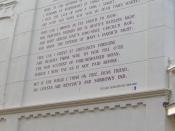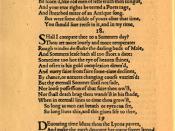William Shakespeare was undoubtedly the most famous writer of all time. He has influenced many generations with his plays, poems, short stories and even sonnets. While many of his sonnets appear initially to have a concrete and material meaning, on further analysis, they deal with intense and deeper subjects such as relationships, time, and death. Two of his sonnets, Sonnet 4 and Sonnet 64, are two such sonnets. Mr. Shakespeare, in Sonnet 4 and Sonnet 64, implores the reader ponder the obligation of a person to interact with society versus the risk of disappointment and sadness that comes with these interactions.
The worldly message contained in Sonnet 4 and Sonnet 64 is clearly evident. In the first quatrain of Sonnet 4, the poet is critically speaking to a beautiful woman. The poet asks the woman to explain why she is wasting her legacy by keeping to herself.
This is evidenced in the first two lines of the quatrain, which read "Unthrifty loveliness, why dost thou spend Upon thyself thy beauty's legacy?" The poet reminds the woman that her beauty was a free gift of nature. The second quatrain again implores the woman to explain why she is wasting the free gift of beauty, which she was given. The speaker then turns his attention and asks nature why such an enormous loan was bestowed upon a woman who was unwilling to share it. This was evidenced in the line "Profitless usurer, why dost thou use So great a sum of sums, yet canst not live?". In the third quatrain of sonnet 4, the woman is reminded that unless she shares her beauty with society, she will not leave a legacy for future generations. The question "What acceptable audit canst thou leave?" is asking the woman to ponder the...


